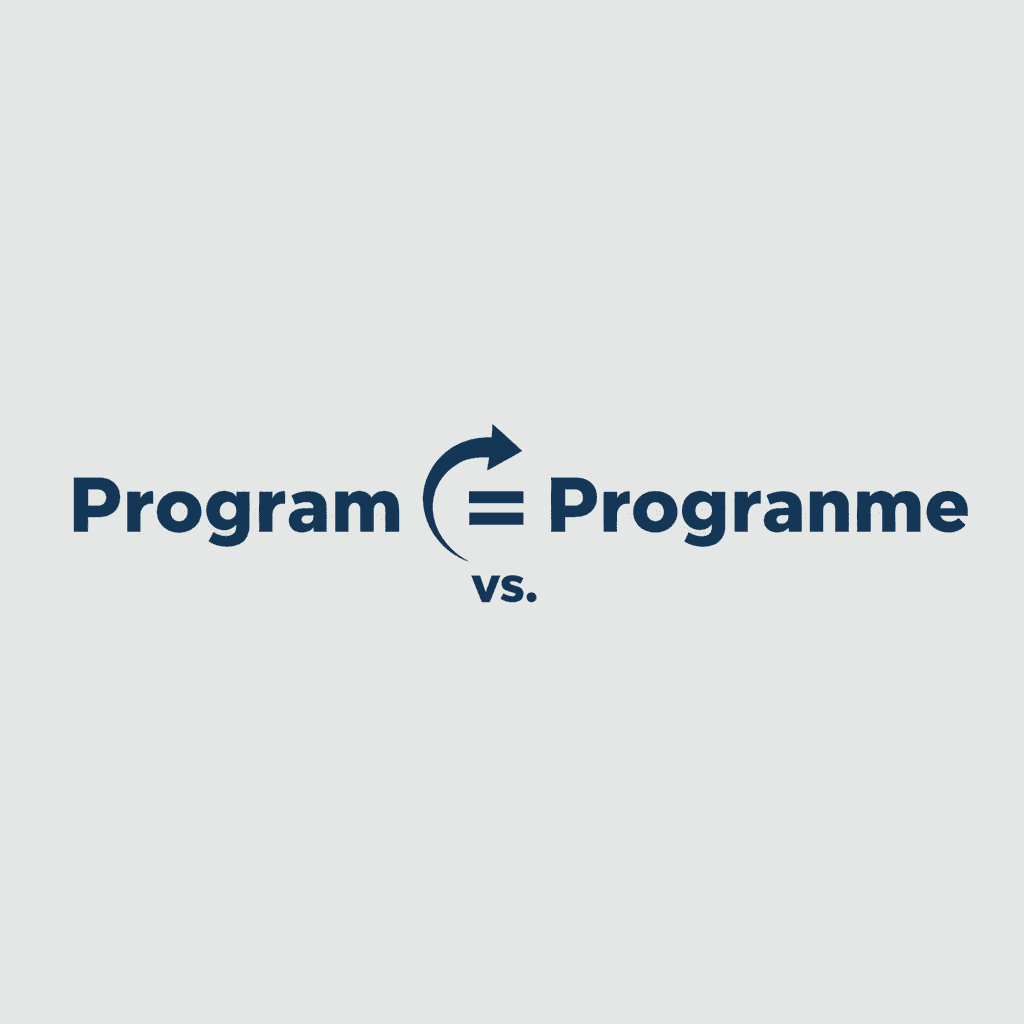Program vs. Programme: What’s the Difference?
 Both program and programme mean almost the same thing — a planned set of activities or events — but the spelling differs depending on where you live.
Both program and programme mean almost the same thing — a planned set of activities or events — but the spelling differs depending on where you live.
Here’s the quick rule:
- Program → American English spelling 🇺🇸
- Programme → British English spelling (except for computers) 🇬🇧
1. Program: American Spelling
Meaning
In American English, program is the only correct spelling for all meanings — whether it refers to a TV show, a schedule of events, or a computer application.
Examples (10 total)
- I’m watching my favorite program on TV.
- The training program starts next week.
- She wrote a new computer program in Python.
- The summer program includes dance and music.
- Our school launched a reading program for kids.
- He enrolled in a graduate program at Stanford.
- The theater released its annual program of plays.
- That computer program helps edit videos.
- They introduced a recycling program in the city.
- The fitness program promises quick results.
🧠 Tip:
If you’re writing for an American audience, always use program — no exceptions.
2. Programme: British Spelling
Meaning
In British English, programme is used for TV shows, events, or plans — but not for computer-related contexts.
When talking about software, British English also uses program (the American spelling).
Examples (10 total)
- What’s your favorite TV programme on BBC?
- The conference programme looks interesting.
- She signed up for a language programme in London.
- The charity runs a food aid programme.
- I bought a souvenir programme at the concert.
- The government announced a housing programme.
- This educational programme supports young learners.
- The school launched an after-class programme.
- A new documentary programme aired last night.
- The drama programme received excellent reviews.
🧠 Tip:
If it’s British English, use programme for events and TV — but program for computers.
3. Quick Comparison Table
| Context | American English | British English |
|---|---|---|
| TV show | program | programme |
| Schedule or plan | program | programme |
| Educational activity | program | programme |
| Software or app | program | program |
| Example sentence | “The new training program begins Monday.” | “The new training programme begins Monday.” |
4. Regional Summary
- 🇺🇸 U.S. & Canada → Always program
- 🇬🇧 U.K., Australia, New Zealand, India → Usually programme, but program for computing
5. How to Remember
👉 Program = universal and simple — always correct in American English.
👉 Programme = extra “me” for British style — use it outside computers.
💡 Memory Trick:
“Program” is efficient — like a computer.
“Programme” is elegant — like British tea time.
6. Common Mistakes
❌ I watched a great TV program on BBC. (in the U.K.)
✅ I watched a great TV programme on BBC.
❌ She’s studying a new computer programme.
✅ She’s studying a new computer program.
7. Why It’s Confusing
Both spellings come from the same root — Greek programma, meaning a written public notice.
When English spread across countries, spelling differences formed: Americans simplified to program, while Brits kept programme for traditional contexts.
Even smart grammar tools like Humanizey automatically adjust for regional spelling, ensuring your text uses the right version depending on your location or audience.
FAQs
1. Is “programme” wrong in the U.S.?
Yes. Americans always use program, even for TV or events.
2. Can I use “program” in the U.K.?
Yes — for computers, or if you prefer modern, simplified English.
3. Which spelling is used internationally?
Program is more widely accepted worldwide, especially in digital or academic contexts.
4. Should I match the spelling to my audience?
Definitely. Use program for American readers and programme for British ones.
Practice: Choose the Correct Word (“Program” or “Programme”)
(Answers are listed at the end.)
- The coding ___ was developed by engineers in Silicon Valley.
- BBC aired a new wildlife ___.
- She joined a student exchange ___.
- The government launched a health ___.
- I downloaded a new editing ___.
- The conference ___ starts tomorrow.
- He’s designing a software ___.
- The school introduced an after-class ___.
- That TV ___ won several awards.
- They’re expanding their recycling ___ next year.
Answers
- program
- programme
- programme
- programme
- program
- programme
- program
- programme
- programme
- programme
